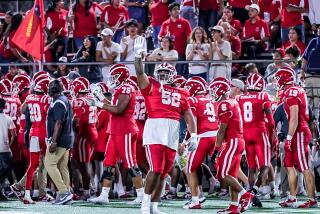Prep Wednesday : MANAGING JUST FINE : At Mater Dei, These Guys Do More Than Just Pick Up Towels and Sweep the Floor
- Share via
Hey, you want to talk student basketball managers? You want to talk about guys with a nose for the locker room (Eeeeuuuu), guys who are serious PTTPers (Prime-Time Towel Pickers)? You want to see guys who can do the give and go, as in Gimme a water bottle a nd go get the basketballs , and do it without getting the players’ perspiration on the sweater they just had dry cleaned?
Well, you’re talking Mater Dei High School’s Toweling Titans, its Sultans of Sweats--seniors George Denninghoff and Chris Holmes. They have devoted a combined 7 years to managing the Mater Dei basketball team and have incurred and endured walking pneumonia and midnight rendezvous at gas stations to do it.
In turn, the job has lent direction to their lives, changed the foundation of their beings and, perhaps most importantly, given them an avenue and an adjustable basketball stand on which to dunk.
“We live to dunk,” says Holmes.
Maybe, but if it weren’t for managing Holmes wouldn’t be at Mater Dei or have discovered that he wants to coach.
If it weren’t for managing, Denninghoff, in his words, “would still be the quiet kid sitting in the corner,” and wouldn’t have a shot at a college scholarship.
If it weren’t for managing, Aaron Abler, a junior, would be playing junior varsity basketball.
“I told him if he went out for the team he would make it,” said Gary McKnight, Mater Dei basketball coach. “The kid is 5-11 and can dunk. He’s a great athlete, but he told me no. He’d rather manage than play. These kids love what they do.”
Why not? Denninghoff is hoping to turn this experience into an athletic scholarship to Syracuse University as a manager.
“Things look pretty good right now,” he said.
Syracuse, whose No. 1 assistant coach, Bernie Fine, was a student manager there in the late 1960s, is one of many major institutions to offer such scholarships. UCLA and Indiana also offer scholarships.
Holmes wants to be a coach and is encouraged that such coaches as Fine and William and Mary head Coach Chuck Swenson, who was a student manager at Indiana under Bob Knight, made the long slide from end of the bench to the front.
“Chris will take notes during practice and then ask me why we do things the way we do,” said Dave Taylor, Mater Dei assistant.
And then there’s UCLA’s Vic Sison, who gained the ultimate after he worked as a student manager under Larry Brown. When Brown went to the New Jersey Nets, he drafted Sison on the 10th round of the NBA draft in a tongue-in-cheek sign of affection.
That may be a bit out of reach, though Denninghoff and Holmes have each grown a foot in their 4 years at Mater Dei, and each has perfected a reverse slam dunk on the adjustable basketball stand, called The Monster, that sits off to one side of the Mater Dei gym.
“They have some killer games on The Monster,” McKnight said. “I mean they are vicious. They crank that thing to about 7 feet and go wild. The players will sometimes stop warming up and just watch these guys go at it. Sometimes I have tell the managers to stop playing so I get my practice under way. Those guys are nuts.”
Denninghoff and Holmes are the unquestioned leaders of the nuts--the others are Abler, Louie Divito, Chris Feynes, Mark Nolan and Mike Sauer. That’s 7 managers, an enormous number when you consider most high school programs are grateful to have one.
Of course, hoop-wise, everything is bigger at Mater Dei. So big that the program, which has won 5 Southern Section titles and a state championship in the 1980s, has 3 home courts, 2 of which are located on college campuses--Chapman and UC Irvine.
All of which made Denninghoff’s answering an ad for a team manager 4 years ago unlikely. Well-mannered and quiet, Denninghoff had never been part of an organized sport before Mater Dei.
He saw the ad in the student bulletin and went to McKnight’s office to apply, admitting that walking past human beings almost 2 feet taller than he was made him nervous. As did the fact that he was stepping into a world he knew absolutely nothing about.
Paula Garcia, Denninghoff’s mother, never pushed her son into athletics. If anything, she may have nudged him the other way. She works at Rancho Santiago College and says she had seen too many kids “who put sports ahead of everything.”
Nature seemed to cooperate with her wishes since George was 4-feet 11-inches tall when he showed up for the first day of classes at Mater Dei, and was the same height when he walked into McKnight’s office as a freshman.
“I didn’t know what I was getting into,” he said. “To this day, I don’t know why I answered the ad, it’s just something I thought I’d like to do.”
Four years later, even Paula, who has asked George on several occasions why he does this, admits that the experience has, “helped George grow up.”
Lesson No. 1 came just a week after Denninghoff started when he missed a practice, believing that a program as big as Mater Dei’s would never miss a kid 4-11.
Wrong.
“The next time Coach McKnight saw me he just laid into me, yelling,” Denninghoff said. “I was scared at first, but it also made me feel like I was needed. In a weird way, Coach McKnight yelling at me was a great thing.”
Since that episode he has missed only 2 games. Once when he came down with walking pneumonia, the other when he had to visit relatives.
Holmes missed the first half of last season when his family--going through financial straits--took him out of Mater Dei ($2,600 tuition a year) and enrolled him at Capistrano Valley High, 10 minutes from the Holmes house--at the beginning of the 1987 school year.
He was miserable. He missed managing. He missed Mater Dei’s high basketball profile.
“Mater Dei as a school is pretty good,” Holmes said. “But to be honest, the only reason I wanted to come back was to manage. If it wasn’t for that, I’d still be at Capistrano Valley.”
Holmes returned to Mater Dei in January after the school agreed to help the family finance his tuition.
Unlike Denninghoff, Holmes had played sports before he got to high school. He was a fairly accomplished basketball player at Mission Elementary School in San Juan Capistrano. Like Denninghoff, he was small, 4-10 as a ninth-grader. Unlike Denninghoff, Holmes was able to make up for being short in stature by being long on words.
“I’m a mouth,” he admits.
His mother, Maureen, said: “Chris was talking before he could talk. As a baby, he would move his hands around as if he was trying to tell you something. Nothing has changed. Chris talks.”
Holmes also listened to a lot of jokes about his height, perhaps by those envious of his gregarious personality or athletic skills. In response, his mother says, Chris developed “a sharper tongue.”
After playing a year with the freshmen team, Holmes joined Denninghoff as the second varsity manager. The tongue came with him. Holmes has been kicked out of the coaching room several times for his verbosity and once received a brief suspension.
Not surprisingly, Maureen reports that Chris’ other career goal is to be a politician.
“I’m trying to control myself, but it’s hard,” he said. “It’s what I am.”
So what does a manager do?
“We hear that all the time,” Holmes said.
The question is: What doesn’t a manager do?
“Basically, they do whatever I tell them to do,” McKnight said.
It’s about giving and collecting towels, water bottles and sweat pants, all the time trying to avoid getting some player’s perspiration on the sweater you just had dry cleaned.
At Mater Dei, a manager’s No. 1 duty is filing “The Trunk,” a giant metal grab bag of hoop accessories--water bottles, chalk boards, first-aid kits, towels, etc.
When full, the trunk weighs almost 200 pounds. And who carries that 200 pounds, some stud basketball player?
Chriiiis, Geooorge, Aaaaaron!
Practice or game, the managers are on the court before the players--sweeping, cleaning, preparing. After a practice they must clean up again and rebound for any player who wants to do some extra shooting.
“I’ve had to turn out the lights on some guys because it was getting so late,” Denninghoff said. “I tell them I’d like to get home before midnight.”
After games, managers clean up while the players clear out, which means that after many an away game the managers don’t get home until midnight or later.
Holmes, who lives in San Juan Capistrano, used to be driven by McKnight to a pay phone at a Mission Viejo gas station where he would phone his mother to pick him up.
“If it was an away game, I usually wouldn’t get home until around 1 a.m.,” Holmes said.
Holmes continued to work as a sophomore after developing bronchitis, which he believes was a result of standing outside a certain gas station. George keeps a job at a record store on top of his other duties.
Which raises the question: Why do this?
One thing that can’t be discounted is the allure of a program as successful as Mater Dei. Abler, the could-be player, explained the reason he preferred to manage was that he “had already been part of the varsity and I wasn’t interested in taking a step back.”
Managers make all the trips and are held to the same code of conduct as the players.
“I’m as much a part of this program as any player,” said Denninghoff, who has three Southern Section championship rings to prove it. Only one non-coach at Mater Dei has more; that’s Kevin Rembert with four.
Last season Holmes and Denninghoff were forced to run laps on the road after making too much noise in their room the night before. And a Mater Dei player recently was given a brief suspension for taunting Denninghoff.
That’s why, after Mater Dei won its fourth consecutive 5-A championship last season, it hurt Denninghoff to see himself identified as a fan in a newspaper photograph of him hugging guard Mark Ramstack.
“A fan,” he says with the same disdain that usually accompanies a traffic ticket.
Denninghoff knows his place on this team; he knew it that day at the beginning of his junior year.
Mater Dei had won the state championship his sophomore year. When it came time for the the team to order their championship rings, Denninghoff told McKnight that it didn’t fit in the family budget.
“The next year, at the start of the season, Coach McKnight walked up to me and said, ‘Here,’ ” George said.
It was a state championship ring. McKnight had bought it for him.
More to Read
Go beyond the scoreboard
Get the latest on L.A.'s teams in the daily Sports Report newsletter.
You may occasionally receive promotional content from the Los Angeles Times.










